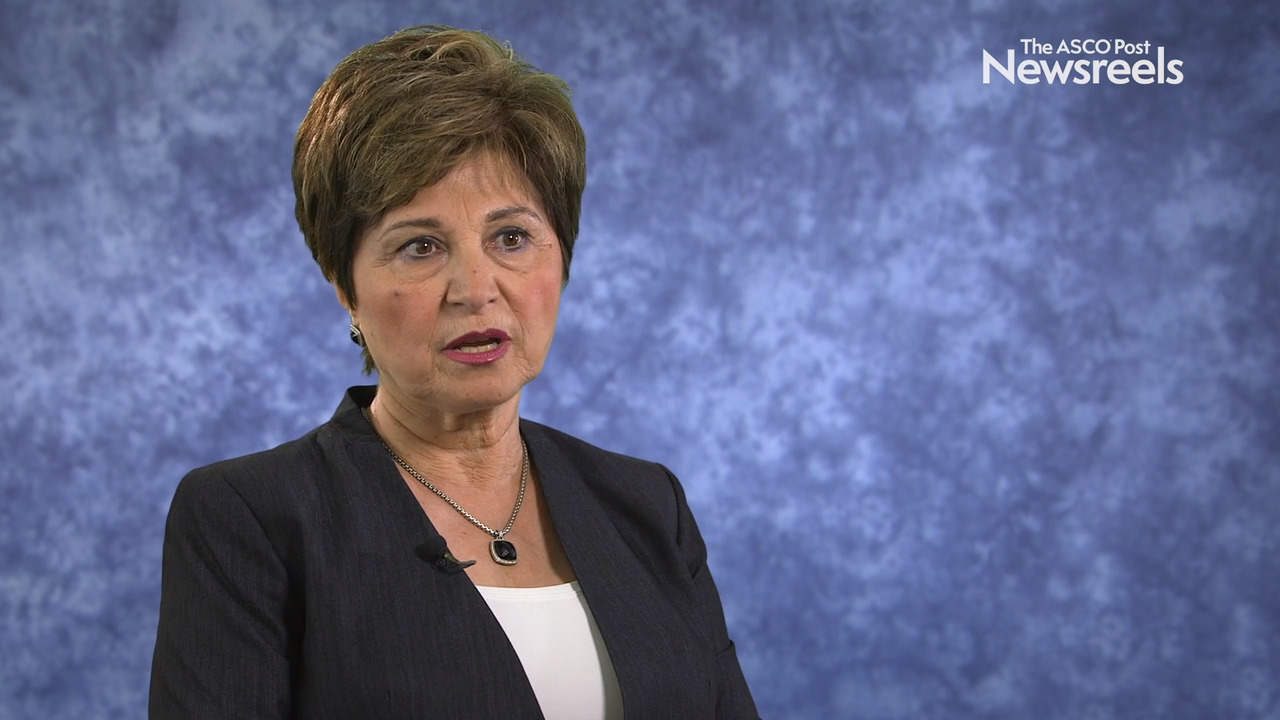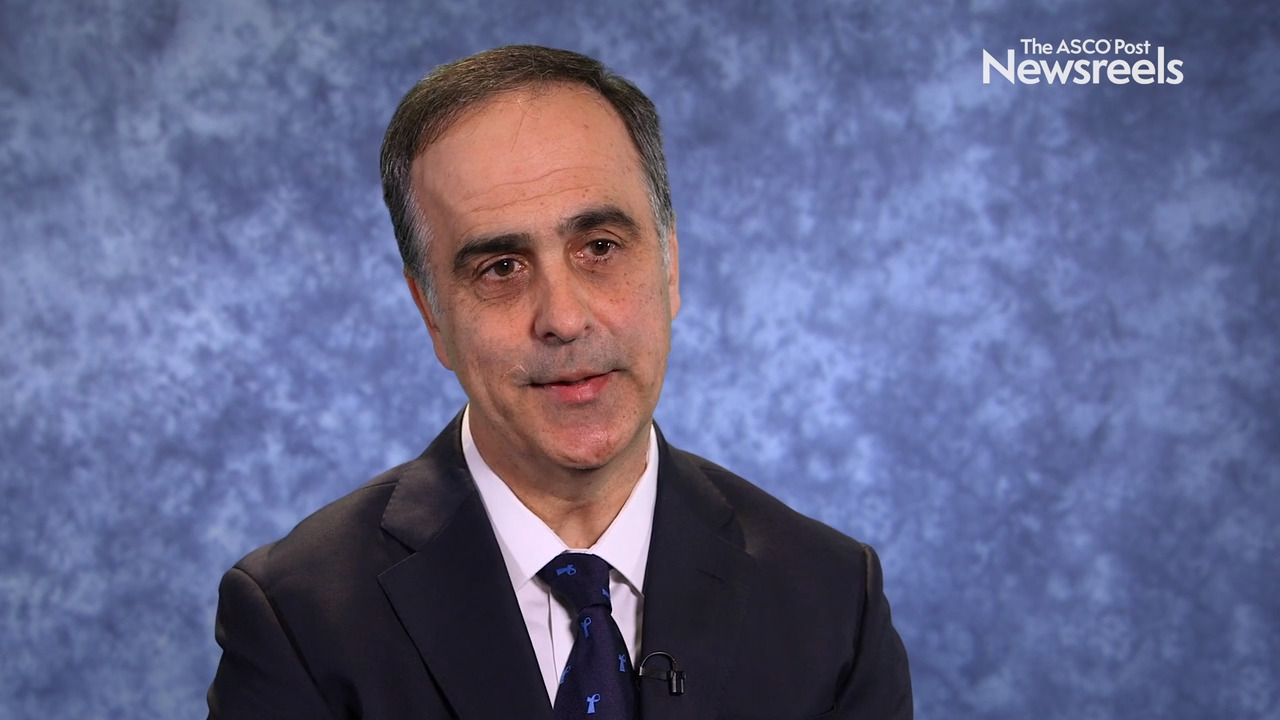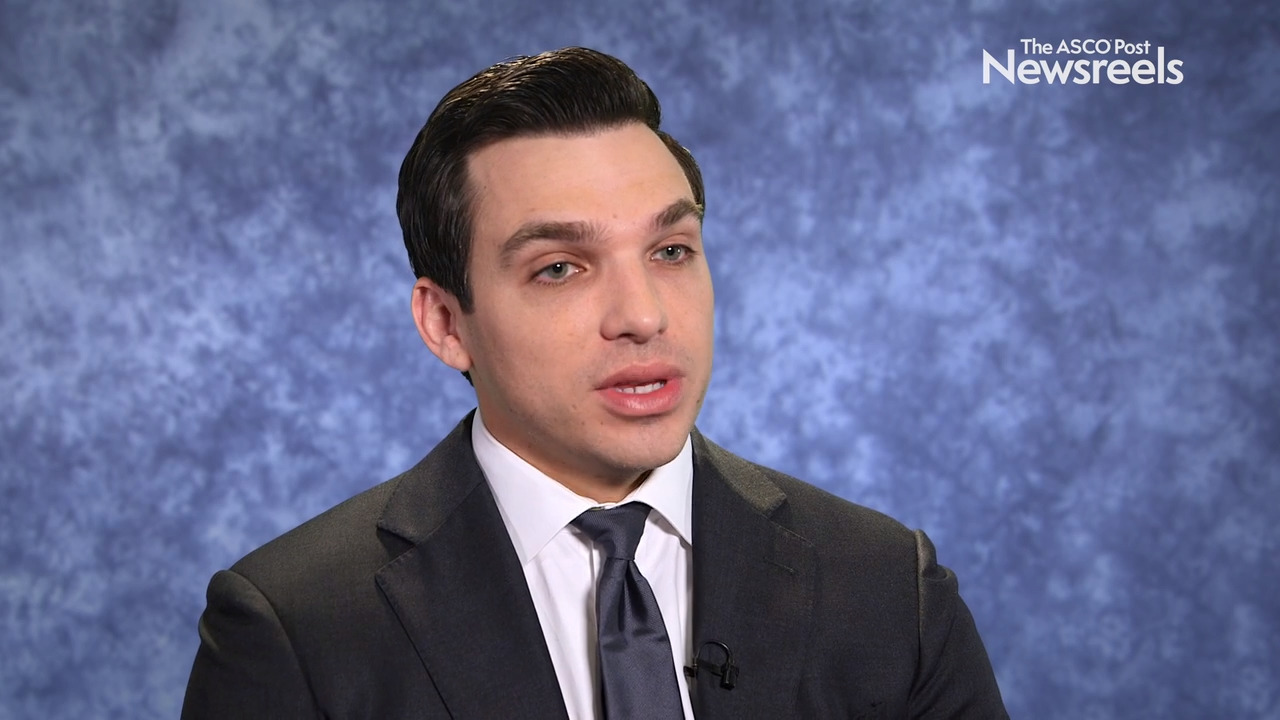Olaparib for Previously Treated, Metastatic Castration-Resistant Prostate Cancer With DNA Repair Gene Aberrations
In the phase II TOPARP-B trial—reported by Mateo et al in The Lancet Oncology—investigators found that olaparib showed activity in men with metastatic castration-resistant prostate cancer and DNA damage response (DDR) gene aberrations who had received one or two prior taxane regimens. Study...
Neoadjuvant vs Concurrent ADT With Dose-Escalated Radiotherapy for Localized Prostate Cancer
In a two-institute phase III trial reported in the Journal of Clinical Oncology, Malone et al found no difference in biochemical relapse–free survival with androgen-deprivation therapy (ADT) initiated prior to or concurrently with dose-escalated external-beam radiotherapy in patients with localized ...
Sequencing of Enzalutamide and Abiraterone Acetate in Metastatic Castration-Resistant Prostate Cancer
In a Canadian phase II crossover trial reported in The Lancet Oncology, Kim N. Chi, MD, and colleagues found that time to second prostate-specific antigen (PSA) progression from start of treatment was longer with crossover from abiraterone acetate/prednisone to enzalutamide vs the reverse sequence ...
Commercial Gene-Expression Tests for Prostate Cancer May Not Accurately Predict Disease Progression in African American Men
A study examining the differences in gene expression between African American and European American men with prostate cancer for three commercially available prostate cancer prognostic biomarker panels—Oncotype DX Prostate Score, Prolaris, and Decipher—has found that these tests may not accurately...
Pembrolizumab in Refractory Metastatic Castration-Resistant Prostate Cancer
In the phase II KEYNOTE-199 study, reported in the Journal of Clinical Oncology by Antonarakis et al, pembrolizumab showed activity and had an acceptable safety profile in patients with treatment-refractory metastatic castration-resistant prostate cancer. Study Details The trial was conducted at 85 ...
FDA Approves Enzalutamide for Patients With Metastatic Castration-Sensitive Prostate Cancer
On December 16, the U.S. Food and Drug Administration (FDA) approved enzalutamide (Xtandi) for patients with metastatic castration-sensitive prostate cancer. The FDA previously approved enzalutamide for patients with castration-resistant prostate cancer. ARCHES Trial Efficacy was investigated in...
Is Nonmetastatic Castration-Resistant Prostate Cancer a Valid Disease Category?
Does nonmetastatic castration-resistant prostate cancer really exist? Although it is considered a disease category, it turns out that the definition depends on the type of imaging used. Many patients with castration-resistant prostate cancer who were categorized as “nonmetastatic” on conventional...
RSNA 2019: MRI-Guided Ultrasound Treatment for Localized Prostate Cancer
A novel magnetic resonance imaging (MRI)-guided procedure that uses therapeutic ultrasound may effectively treat prostate cancer with minimal side effects, according to a new study presented at the 2019 annual meeting of the Radiological Society of North America (RSNA) (Abstract SSC07-07)....
Biomarker-Driven Treatment Selection for Prostate and Other Genitourinary Cancers
As the Nobel Laureate Bob Dylan wrote, “The times they are a-changin’.” Heather Cheng, MD, PhD, Associate Professor, University of Washington, Associate Member, Fred Hutchinson Cancer Research Center, and Director, Seattle Cancer Care Alliance, Prostate Cancer Genetics Clinic, quoted this line in...
Sequencing of Enzalutamide and Abiraterone Acetate in Metastatic Castration-Resistant Prostate Cancer
In a Canadian phase II crossover trial reported in The Lancet Oncology, Kim N. Chi, MD, and colleagues found that time to second prostate-specific antigen (PSA) progression from start of treatment was longer with crossover from abiraterone acetate/prednisone to enzalutamide vs the reverse sequence...
Activity of Anti-STEAP1 Antibody-Drug Conjugate in Patients With Metastatic Castration-Resistant Prostate Cancer
In a phase I trial reported in the Journal of Clinical Oncology, Danila et al found that the antibody-drug conjugate DSTP3086S, which targets the six-transmembrane epithelial antigen of the prostate 1 (STEAP1), had acceptable safety and evidence of activity in patients with metastatic...
University of Michigan Cancer Programs Receive $9.2M Grant for Prostate Cancer Research
Two Michigan cancer programs are joining forces to find new solutions for prostate cancer. The University of Michigan (U-M) Rogel Cancer Center and the Barbara Ann Karmanos Cancer Institute at Wayne State University have received a $9.2 million grant from the National Cancer Institute (NCI). The...
Apalutamide for Metastatic Castration-Sensitive Prostate Cancer
On September 17, 2019, apalutamide was approved for the treatment of patients with metastatic castration-sensitive prostate cancer.1,2 Supporting Efficacy Data The approval is based on overall survival and radiographic progression-free survival findings in the phase III double-blind TITAN trial.2,3 ...
ESMO Congress 2019: Quick Takes From Key Clinical Trials
The ESMO Congress continues to grow as a pivotal platform for research in clinical oncology. At the ESMO Congress 2019, important findings were showcased in more than 2,200 studies, including 93 late-breaking abstracts. The ASCO Post summarized much of that news in separate articles over several...
Expert Point of View: Eleni Efstathiou, MD
Formal study discussant Eleni Efstathiou, MD, of MD Anderson Cancer Center, Houston, commented on results of the PROfound trial at the ESMO Congress 2019. “This is the first phase III targeted therapy trial to deliver a positive outcome in metastatic castration-resistant prostate cancer,” she...
Phase III PROfound Study Evaluates Olaparib in Setting of Metastatic, Castration-Resistant Prostate Cancer
Treatment with the poly (ADP-ribose) polymerase (PARP) inhibitor olaparib delayed disease progression and appears to improve survival, compared with newer hormonal agents in men with pretreated metastatic castration-resistant prostate cancer and homologous recombinant repair (HRR) genetic...
Expert Point of View: Silke Gillessen, MD
Formal discussant Silke Gillessen, MD, of the Division of Cancer Sciences, University of Manchester, United Kingdom, agreed that this study is practice-changing. “The study was well designed and addressed an unmet clinical need that is commonly seen in the clinic. Until now we had no randomized...
Third-Line Cabazitaxel Improves Outcomes in Patients With Metastatic Prostate Cancer
Third-line treatment with cabazitaxel extended progression-free survival and overall survival in men with metastatic castration-resistant prostate cancer in the CARD trial. These results provide the first evidence from a randomized phase III trial for a survival benefit with third-line therapy, and ...
Apalutamide Treatment for Metastatic Castration-Sensitive Prostate Cancer and Health-Related Quality of Life
In an analysis of the phase III TITAN trial reported in The Lancet Oncology, Neeraj Agarwal, MD, and colleagues found that that treatment with apalatuamide was associated with preserved health-related quality of life, including pain and fatigue outcomes, in patients with metastatic...
Acute Toxicity With Intensity-Modulated Fractionated Radiotherapy vs Stereotactic Body Radiotherapy for Prostate Cancer
In an analysis from the phase III PACE-B trial reported in The Lancet Oncology, Nicholas van As, MD, and colleagues found that shortened treatment courses with stereotactic body radiotherapy did not increase gastrointestinal or genitourinary acute toxicity vs intensity-modulated fractionated...
2019 NCRI: Higher IGF-1 and Free Testosterone Levels May be Risk Factors for Prostate Cancer
Men with higher levels of free (biologically active) testosterone and insulin-like growth factor-1 (IGF-1) in their blood are more likely to be diagnosed with prostate cancer, according to research presented by Travis et al at the 2019 National Cancer Research Institute (NCRI) Cancer Conference....
DNA Vaccine for Patients With Progressive, Nonmetastatic, Castration-Sensitive Prostate Cancer
In a phase II study reported in the Journal of Clinical Oncology, McNeel et al found that a DNA vaccine (pTVG-HP) encoding prostatic acid phosphatase did not improve 2-year metastasis-free survival vs control treatment in patients with progressive, nonmetastatic, castration-sensitive prostate...
Targeted Therapy Moves Into Metastatic Castration-Resistant Prostate Cancer With Strong Showing by Olaparib and Rucaparib
Treatment with olaparib delayed disease progression, and early survival data suggest a positive trend in favor of olaparib compared with newer hormonal agents in men with pretreated metastatic castration-resistant prostate cancer and homologous recombinant repair genetic alterations—specifically...
Long-Term Follow-up of Salvage Short-Term ADT Plus Radiotherapy After Radical Prostatectomy
As reported in The Lancet Oncology by Carrie et al, the 112-month follow-up of the French phase III GETUG-AFU 16 trial has confirmed the initial 5-year report of the trial, which reported improved progression-free survival with the addition of short-term androgen-deprivation therapy (ADT) to...
FDA Pipeline: Treatments for HER2-Positive Breast Cancer, AML; Breakthrough Device for Prostate Cancer; Statement on Safety Information for Breast Implants
Recently, the U.S. Food and Drug Administration (FDA) granted Priority Review to trastuzumab deruxtecan for the treatment of HER2-positive metastatic breast cancer; granted Fast Track designation for bemcentinib for elderly patients with relapsed acute myeloid leukemia (AML); granted Breakthrough...
Apalutamide Treatment for Metastatic Castration-Sensitive Prostate Cancer and Health-Related Quality of Life
In an analysis of the phase III TITAN trial reported in The Lancet Oncology, Neeraj Agarwal, MD, and colleagues found that that treatment with apalatuamide was associated with preserved health-related quality of life, including pain and fatigue outcomes, in patients with metastatic...
Expert Point of View: Gert de Meerleer, MD
Commenting on both RADICALS-RT and the meta-analysis, formal discussant Gert de Meerleer, MD, of the University Hospital, Leuven, Belgium, stated: “A big applause for these trials. I agree with both conclusions and congratulate both groups of authors for finding noncommercial funding.” Dr. de...
Studies Suggest Early Salvage Radiotherapy May Be Preferable to Adjuvant Radiotherapy After Prostatectomy
Early salvage radiotherapy appears to be a better choice after radical prostatectomy for men with prostate cancer than adjuvant radiotherapy, according to late-breaking results from the RADICALS-RT trial and the ARTISTIC meta-analysis of three trials that included RADICALS-RT. Observation after...
Acute Toxicity With Intensity-Modulated Fractionated Radiotherapy vs Stereotactic Body Radiotherapy for Prostate Cancer
In an analysis from the phase III PACE-B trial reported in The Lancet Oncology, Brand et al found that shortened treatment courses with stereotactic body radiotherapy did not increase gastrointestinal or genitourinary acute toxicity vs intensity-modulated fractionated radiotherapy in low-risk to...
Mindfulness Training for Men Diagnosed With Prostate Cancer Who Are on Active Surveillance
GUEST EDITOR Integrative Oncology is guest edited by Jun J. Mao, MD, MSCE, Laurance S. Rockefeller Chair in Integrative Medicine and Chief of Integrative Medicine Service at Memorial Sloan Kettering Cancer Center, New York. The ASCO Post’s Integrative Oncology series is intended to facilitate the...
Nicholas D. James, PhD, MBBS, on the STAMPEDE Trial: Long-Term Subgroup Analysis by Metastatic Burden in Hormone-Naive Prostate Cancer
Nicholas D. James, PhD, MBBS, of University Hospitals Birmingham NHS Trust, discusses results from a long-term follow-up of a cohort treated with docetaxel in the STAMPEDE randomized trial, confirming that the treatment showed benefit in patients with both high- and low-volume disease (Abstract 844O).
Nicholas D. James, PhD, MBBS, on Prostate Cancer: STAMPEDE Trial M1|RT Comparison of Radiotherapy
Nicholas D. James, PhD, MBBS, of University Hospitals Birmingham NHS Trust, discusses the efficacy of prostate radiotherapy plus androgen-deprivation therapy with or without docetaxel in patients with prostate cancer with only lymph node metastases or less than four bone metastases (Abstract 844O).
ESMO 2019: Cabazitaxel vs Abiraterone or Enzalutamide in Previously Treated Metastatic Castration-Resistant Prostate Cancer
As reported at the European Society for Medical Oncology (ESMO) Congress 2019 (Abstract LBA13) and simultaneously published in The New England Journal of Medicine by Ronald de Wit, MD, and colleagues, the phase III CARD trial has shown improved imaging-based progression-free survival and overall...
FDA Pipeline: Advances in Prostate Cancer, Urothelial Cancer, Myelofibrosis, and More
In the past few weeks, the U.S. Food and Drug Administration (FDA) has issued regulatory decisions in prostate cancer, urothelial cancer, myelofibrosis, breast cancer, pediatric brain cancer, leukemia, and skin cancer. Breakthrough Therapy Designation for Niraparib in Metastatic...
Maha H.A. Hussain, MD, on Castration-Resistant Prostate Cancer: Olaparib/Enzalutamide/Abiraterone
Maha H.A. Hussain, MD, of Northwestern University Robert H. Lurie Comprehensive Cancer Center, discusses the phase III PROfound trial results on the efficacy of olaparib in men with metastatic castration-resistant prostate cancer whose tumors harbor alterations in DNA damage response genes and who had disease progression on prior hormone therapy (Abstract LBA12).
Ronald de Wit, MD, PhD, on Prostate Cancer: Results of the CARD Trial on Cabazitaxel, Abiraterone, and Enzalutamide
Ronald de Wit, MD, PhD, of the University Medical Center Rotterdam, discusses study findings which showed that cabazitaxel improved radiographic progression-free survival as well as overall survival in patients with metastatic castration-resistant prostate cancer (Abstract LBA13).
ESMO 2019: Men With Prostate Cancer May Avoid Postoperative Radiotherapy, Study Finds
Men with prostate cancer may be spared radiotherapy after surgery, according to late-breaking results of the RADICALS-RT trial presented by Parker et al at the European Society for Medical Oncology (ESMO) Congress 2019 (Abstract LBA49_PR). The study answers a long-standing question about whether...
Investigating the Inflammatory Mechanisms That May Be Causing Prostate Cancer in World Trade Center First Responders
The terrorist attacks on September 11, 2001*, on the World Trade Center in New York City resulted in the deaths of more than 2,700 people.1 Nearly 2 decades later, that number may soon be exceeded by the more than 2,000 deaths—and climbing—of first responders to the attack, including firefighters,...
AACR Disparities: Uninsured/Underinsured, Lower-Income, and/or Minority Patients More Likely to Receive Cancer Diagnosis After ED Visit
Medicare patients from lower socioeconomic groups and several ethnic minority groups were more likely to be diagnosed with cancer following an emergency department visit, according to results of a study presented at the 12th American Association for Cancer Research Conference on The Science of...
Andrew Kneebone, MD, on an ANZUP Trial on Adjuvant vs Early Salvage Radiotherapy After Prostatectomy
Andrew Kneebone, MD, of Royal North Shore Hospital, discusses phase III study findings showing that at 5 years, biochemical control was similar between adjuvant and early salvage radiotherapies, the latter sparing half of the men potential side effects of radiotherapy without any significant compromise in outcome (Abstract 77).
Ryan Phillips, MD, PhD, on Oligometastatic Prostate Cancer: ORIOLE Trial on Observation vs Stereotactic Ablative Radiation
Ryan Phillips, MD, PhD, of Johns Hopkins Medical Institutions, discusses phase II findings suggesting that treatment with stereotactic ablative radiation significantly decreased the risk of disease progression at 6 months and increased progression-free survival (Abstract LBA3).
Adoption of Conservative Management of Prostate Cancer Among Urology Practices
In a study reported in the Journal of Oncology Practice, Modi et al found that the difference in the rates of use of conservative management of prostate cancer widened between lower-use and higher-use urology practices between 2014 and 2018. Study Details Use of a sample of Medicare claims...
Two Fred Hutch Scientists Receive Fellowships for Prostate Cancer Research
Two early-career scientists at Fred Hutchinson Cancer Research Center—Alexandra Corella and Sander Frank, PhD—have received grants to further their prostate cancer research. Ms. Corella, a graduate research assistant, won a $25,000, 1-year fellowship from the Ford Foundation Fellowship Programs,...
Daniel E. Spratt, MD, on the Impact of Antiandrogen Treatment in Prostate Cancer: NRG Oncology/RTOG 9601 Trial
Daniel E. Spratt, MD, of the University of Michigan, discusses phase III study findings showing that 2 years of antiandrogen therapy increased cardiac and neurologic toxicities, as well as mortality from causes other than prostate cancer, in men with low levels of prostate-specific antigen after prostatectomy who received adjuvant early salvage radiotherapy (Abstract LBA1).
FDA Approves Apalutamide for Metastatic Castration-Sensitive Prostate Cancer
On September 17, the U.S. Food and Drug Administration (FDA) approved apalutamide (Erleada) for patients with metastatic castration-sensitive prostate cancer. Apalutamide was initially approved by the FDA in 2018 for patients with nonmetastatic castration-resistant prostate cancer. TITAN Trial...
ASTRO 2019: Long-Term Hormone Therapy May Increase Other-Cause Mortality in Men With Prostate Cancer Receiving Early Salvage Radiotherapy
Findings from the randomized phase III NRG Oncology/RTOG 9601 trial were initially reported in 2017, and showed that the addition of 2 years of antiandrogen therapy to postsurgical radiation treatment for men with recurrent prostate cancer increased their long-term overall survival rate. That study ...
ASTRO 2019: ORIOLE Trial: Observation vs SABR for Oligometastatic Prostate Cancer
The randomized, phase II ORIOLE trial studying the efficacy of targeted high-dose radiation for men with oligometastatic prostate cancer has shown that stereotactic ablative radiation (SABR) is an effective and safe option for patients who wish to delay hormone-suppression therapy. Data from the...
TITAN Trial: Apalutamide Adds to Options for Men With Metastatic Hormone-Sensitive Prostate Cancer
Androgen-deprivation therapy has been, and remains, the standard of care for patients with metastatic prostate cancer. Patients are often surprised to know that was all we would do to control their disease and sometimes asked why they would not get chemotherapy, as for other cancers. I would take...
Addition of Apalutamide to Androgen-Deprivation Therapy in Metastatic Castration-Sensitive Prostate Cancer
As reported in The New England Journal of Medicine by Kim N. Chi, MD, of BC Cancer and Vancouver Prostate Centre, and colleagues, the first analysis of the phase III TITAN trial has shown that the addition of apalutamide to androgen-deprivation therapy improved radiographic progression-free and...
Many Choices Now for Men With Metastatic Hormone-Sensitive Prostate Cancer: How to Decide?
Based on the recently published ENZAMET, ARCHES, and TITAN trials,1-3 we now have several choices of systemic combination therapies for men with metastatic hormone-sensitive prostate cancer; the ENZAMET trial is reviewed in this issue of The ASCO Post. In 2019, men are now faced with decisions of...







